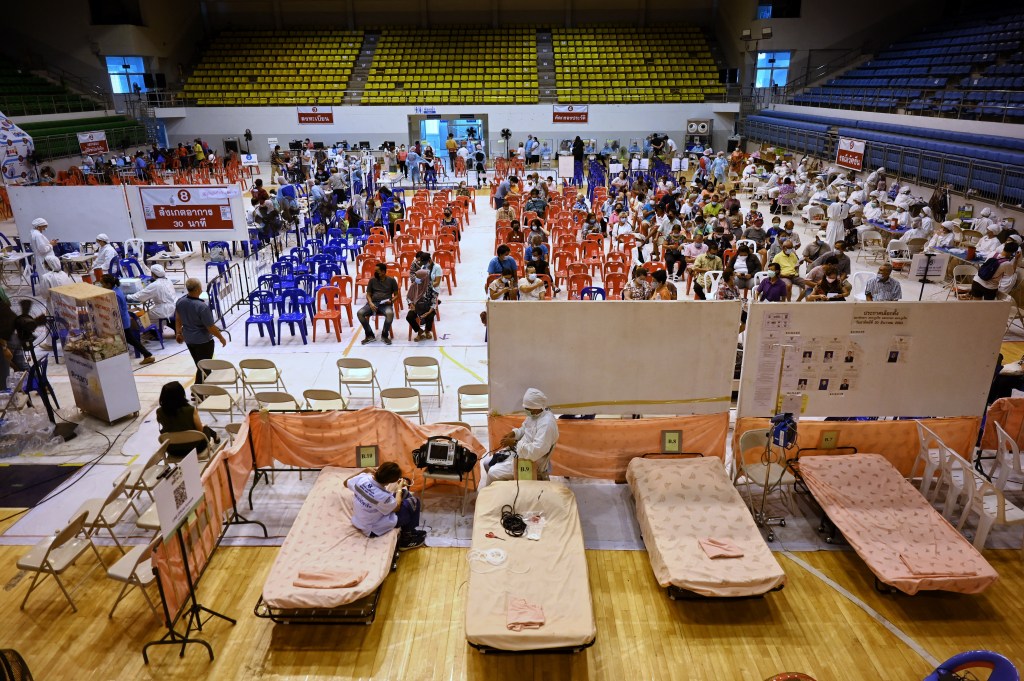Thai authorities were not amused when a recent engineering graduate allegedly added critical descriptions to the Thai-language Wikipedia page of the kingdom’s chief COVID-19 adviser, prompting a legal complaint and investigation.
The unidentified 24-year-old now faces criminal defamation as well as possible computer crime charges for the rewrite, which referred to the senior adviser as the “Sinovac salesman for Prayut Chan-O-Cha’s government.”
Videos by VICE
Prayut is the prime minister of Thailand, which is trying to contain its worst coronavirus outbreak since the pandemic started. The Southeast Asian country has relied heavily on China’s Sinovac jab as well as a locally manufactured version of AstraZeneca.
Police searched the man’s Bangkok home and confiscated his smartphone on Monday, several days after a representative of top expert Dr. Yong Poovorawan, a virologist at Thailand’s prestigious Chulalongkorn University, filed a complaint against him.
Yong has been the subject of intense social media debate over what critics see as his defense of Sinovac. This week, he declared that a mix-and-match of the Sinovac and AstraZeneca vaccines can provide better immunity. He could not be reached for comment.
In a Facebook post about the alleged edit, Thailand’s Cyber Crime Investigation Bureau urged the public to “not modify information to defame third parties in a matter that could ruin their reputation, discredit them or expose them to hatred.” It also asked people to check the accuracy of online information and report any “fake news” to them.
According to the bureau, which is under the Royal Thai Police, the graduate violated section 326 of the kingdom’s criminal code, which deals with defamation and is punishable by up to a year of imprisonment or a fine of about $613—or both. Authorities are now collecting evidence and inspecting the accused’s phone to determine if the more serious Computer Crime Act, which carries a maximum sentence of five years, has been violated as well.
As of Wednesday afternoon, the English Wikipedia page for Yong was also edited with unflattering remarks and accusations that the complaint was all a waste of “valuable police resources.” It is unclear if authorities were aware of the edit.
The World Health Organization has approved Sinovac’s COVID vaccine for emergency use. Though some studies show it is only a little more than 50 percent effective against infection, data also suggests much better protection against death and severe illness. But news reports across Asia about fresh outbreaks in countries that have used Sinovac’s jab have hurt its reputation.
Distrust is widespread in Southeast Asia, where many countries including Thailand, Indonesia and Myanmar have been hit with new waves of the virus. Concerns over efficacy have been growing as the highly contagious Delta variant rips through the region.
In Thailand, authorities are also struggling to pick up the pace of its vaccine drive, which has yet to catch up with neighboring countries like Singapore and Cambodia. Thailand’s nationwide campaign only began last month, and as of Tuesday, more than nine million people—or about 13 percent of the population—have received at least one jab since June 7.
On Wednesday, Thailand recorded 9,317 new coronavirus cases and 87 deaths, much higher numbers than in previous months.
Authorities imposed curfews in Bangkok and other high-risk areas this week, ordering malls and businesses to close and imposing a ban on gatherings of more than five people.
Earlier this month, a leaked health ministry document reported by Reuters revealed internal government concerns over the effectiveness of Sinovac’s vaccine. The memo included a comment from an unidentified official who recommended not to give Pfizer booster shots to frontline health workers who have already been inoculated with Sinovac because it would be like “admitting that the Sinovac vaccine is not effective.”
The document was later confirmed to be authentic by Thailand’s health minister, but was dismissed as only an individual’s opinion.






